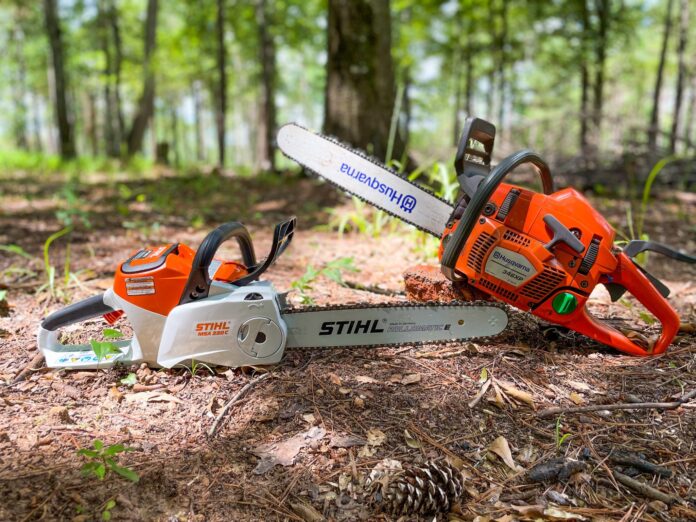AUBURN UNIVERSITY, Ala. – Many tool manufacturers are offering batteries as an alternative power source to gasoline in today’s market. Chainsaws are one of the newest pieces of equipment that are now utilizing rechargeable batteries. These newer chainsaws are often quieter and require less maintenance than traditional saws. However, just because they are battery-powered, doesn’t mean they are not dangerous. No matter what make or model of saw you operate, one component remains the same, safety.
Electrical revolution
Similar to the automotive industry, the tool industry is also converting iconic equipment to battery operation. Popular brands are pushing this source of power in order to combat carbon emissions and climate change. Two of the most appealing aspects of electrical equipment are convenience and easy maintenance. Many people prefer to use batteries instead of mixing gasoline and oil. Furthering the appeal is a negligible difference in sustained performance output between the two power sources.
Combustion engines can deliver damaging decibels to your ears and emit carbon dioxide (CO2) as well as harmful particulate matter. With the environment and human health in mind, manufacturers are moving in the electrical direction to combat noise and gaseous pollution. For example, running a small two-cycle engine (e.g., a chainsaw) for one hour emits the same amount of pollution as driving the average car 1,100 miles. Battery motors are fumeless, making them better suited for the environment – especially for gas saw operators, who are exposed to three to eight times more air pollutants than the average person. Electric saws are also tremendously quieter, making them ideal for residential areas.
“Don’t allow the ease of operation and reduced sound from battery-powered saws lull you into leaving your personal protective equipment (PPE) at home,” said Beau Brodbeck, an Alabama Cooperative Extension System community forestry and arboriculture specialist. “These saws are powerful and equally dangerous.”
Regardless of your chainsaw choice, safety while operating any piece of equipment is imperative. Review the following tips to ensure your safety as well as others around you.
Chainsaw safety tips
Before operating a chainsaw, don’t forget your PPE, which could – most importantly – save your life. Accidents happen in the blink of eye for both inexperienced and overconfident operators.
“It does not matter if you plan to run the saw for five minutes or five hours,” Brodbeck said. “You must wear the following safety equipment.”
- Chainsaw chaps. Chaps prevent injuries to your legs where half of saw accidents occur.
- Safety glasses. Protect your eyes from flying debris.
- Earmuffs or plug. Even electric powered saws, if run long enough, can cause long-term hearing loss.
- Hardhats. When working in or around trees, branches can become dislodged and strike operators.
- Boots. Wear sturdy footwear that protects your feet from saw teeth.
- Gloves. Hand protection should always be worn, especially when maintaining saws.
More information
Don’t put yourself or others around you in potential danger by leaving your PPE at home. Safety standards are vital when operating any chainsaw. More chainsaw safety information is available in the Alabama Extension publications Chainsaw Safety: Safety Features and Maintenance and Chainsaw Safety: Personal Protective Equipment.
For more information on chainsaw safety and operation, visit the Alabama Extension website at www.aces.edu.
Trade and brand names used in this publication are given for information purposes only. No guarantee, endorsement, or discrimination among comparable products is intended or implied by the Alabama Cooperative Extension System.





























